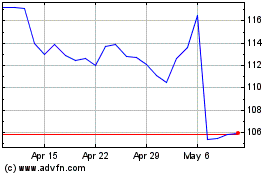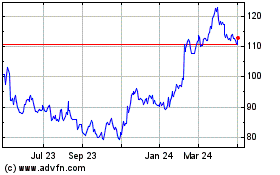Disney Is Priced for a Thrill Ride
February 11 2021 - 7:00PM
Dow Jones News
By Dan Gallagher
Walt Disney Co. has sold its streaming story well. Investors
will soon need to start paying attention to the other parts of the
empire, though.
The entertainment giant's fiscal first-quarter results reported
Thursday afternoon were essentially a repeat of its last update.
Customers continue to flock to the company's streaming offerings
but much less to its theme parks and other parts of the company's
business that depend on crowds. Revenue of $16.25 billion edged the
Wall Street consensus of $15.9 billion, while operating income of
$29 million was nearly double the consensus forecast -- even though
it also diminished by 99% from the same period last year.
Disney's share price still rose a further 2% after hours
following the results. Investors have taken to focusing exclusively
on the company's successful streaming business. Disney+ hit 94.9
million paid subscribers by the end of the quarter -- exceeding the
89.7 million expected by analysts, according to forecasts tabulated
by Visible Alpha.
Disney managed to pick up 8.1 million subscribers in just the
last month of the quarter, based on an update the company gave at
its Dec. 10 analyst meeting. That alone is notable given the
competition Disney faces from its growing raft of streaming
competitors. The month included the launch of "Wonder Woman 1984"
on HBO Max -- the first of a slate of Warner Bros. films that will
make their debuts on the service this year. But Disney is now
supremely confident in its own streaming prospects; it used that
Dec. 10 meeting to lay out targets to grow as big as Netflix Inc.
by 2024, revving up an already excited investor base. Disney's
stock price has surged 23% since that meeting, compared to a 7%
rise by the S&P 500 over the same period.
But streaming can't float the full empire forever. Disney's
theme-park business has benefited in part from a fractured
government response to the coronavirus pandemic; Florida allowed
the company's resort in Orlando to open at a reduced capacity in
July, while California has said no to the same. As such, theme-park
revenue rose 33% from the September quarter but was down 68% from
the same period last year. Parks have also typically accounted for
about one-quarter of the company's operating income; domestic and
international parks combined lost a little over $1 billion during
the December quarter.
That is a problem shared by Disney's theme-park competitors, but
none of those have a stock price that has jumped 36% over the past
12 months to a record high. The diminished earnings prospects of
crowd-intensive businesses such as parks, cruise ships and
movie-theater exhibitions leaves Disney's stock price now fetching
a multiple of 75 times forward earnings -- a 34% premium to the
multiple commanded by streaming pure-play Netflix.
The Magic Kingdom had better hope this spell doesn't wear
off.
Write to Dan Gallagher at dan.gallagher@wsj.com
(END) Dow Jones Newswires
February 11, 2021 18:45 ET (23:45 GMT)
Copyright (c) 2021 Dow Jones & Company, Inc.
Walt Disney (NYSE:DIS)
Historical Stock Chart
From Aug 2024 to Sep 2024

Walt Disney (NYSE:DIS)
Historical Stock Chart
From Sep 2023 to Sep 2024
